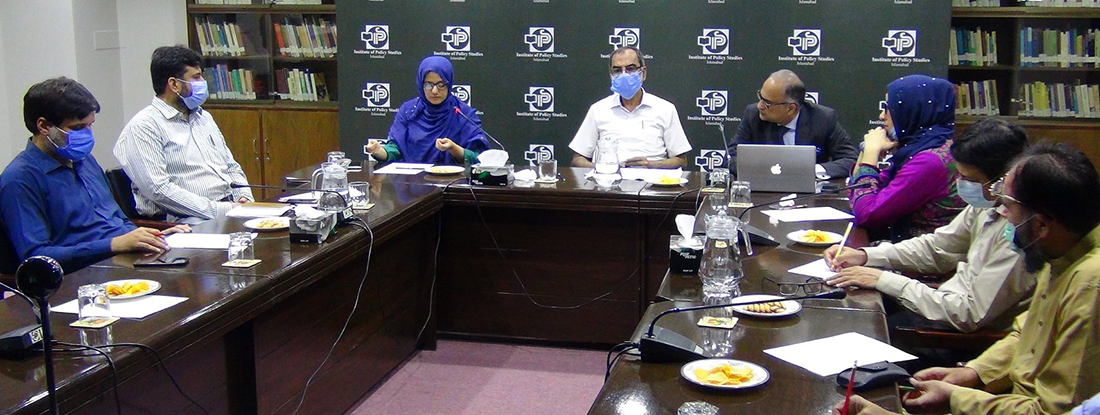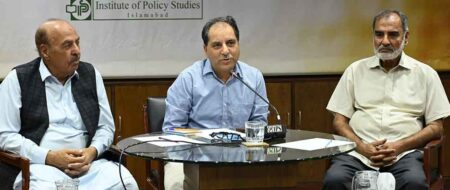Ninth meeting of IPS-Working Group on Kashmir
The ninth meeting of IPS-Working Group on Kashmir (IPS-WGK) was
held on July 22, 2020, close to the conclusion of one year post Indian
abrogation of Article 370 and 35-A in Jammu and Kashmir, and the consequent
Kashmir siege forced on August 5, 2019.
Held as an annual review meeting, the sitting sought to analyze and summarize the findings and recommendations laid out by the Institute’s dedicated working group in their previous nine gatherings held across the year, and then compiling them in form of a consolidated policy brief (Click here to download the brief).
The meeting was chaired by Executive President IPS Khalid Rahman,
and participated by Farzana Yaqoob, IPS associate and general secretary,
IPS-WGK, Syed Mohammad Ali, senior research fellow at IPS, Ambassador (r) Syed
Ishtiaq Hussain Andrabi, Ambassador (r) Tajammul Altaf, Brig (r) Said Nazir
Mohmand, Raja Sajjad Khan, director, Jammu & Kashmir Liberation Cell
(JKLC), Advocate Nasir Qadri, international law expert from Legal Forum for
Oppressed Voices of Kashmir (LFOVK) and GM-IPS Naufil Shahrukh, among others.
The participants proposed the government to cohesively address
Kashmir issue through six different aspects of political, diplomatic,
psychological, legal internal law & law fare, economic, and strategic
domains.
On the political front, it was stressed that all fundamental
rights enshrined in the constitution should also be provided to people of Azad
Jammu and Kashmir (AJK) and Gilgit-Baltistan (GB) and it should be given a
provincial status for the purpose, while ensuring that no action is taken in the
process of this arrangement that compromises the Kashmir cause by mentioning
exclusively that these arrangements/amendments are provisional till the
liberation of Jammu and Kashmir.
Diplomatically, it was recommended that all UN resolutions,
reports and statements by relevant IOs like UN, UNHCR, genocide watch etc.
should be consolidated, regularly updated, published on relevant websites, and
shared globally by foreign offices in a bid to build pressure in support of
sending and keeping UN observers in Indian occupied Kashmir.
Psychologically speaking, it was pointed out that since this is an
era of narrative, Pakistan needs to build a strong, well-thought out narrative
after internal discussions which should then be promoted globally through
all available channels including think-tanks, academia, and mainstream and
digital media.
In terms of legal internal law & law fare, the prospects of
building and eventually filing a case against India for violation of the human
rights at international court (IC) should be evaluated in detail and relevant
law fare strategies should be considered in this respect. The legal right of
the Kashmiri people to protect their lives, honor and properties recognized by
international law and conventions and resist Indian occupation must be
frequently highlighted, whereas stronger words like genocides, ethnic cleansing
and war crimes should be used instead of softer words like human rights
violations.
From the economic aspect, a case should be built under FATF for
economic sanctions on those Indian businesses or commercial entities whose
share holder and equity holder belong to RSS and individuals involved in human
rights violation in IOK. Similarly, a case for considering visa restrictions on
the travel, study, employment and business of those Indians who have been
involved in any human rights violations in IOK or against minorities anywhere
in India, should be gradually built via multilateral forums
In strategic and military domain, the concentration of Indian
military within IOK should be reduced through an indirect strategy to provide
relief to Kashmiri people and also reduce military threat towards Pakistan, AJK
and GB. The situation in IOK also warrants high state of alert by Pakistani
armed forces to ensure India does not conduct any military actions trying to
divert diplomatic and political discussion away from the deteriorating
situation in IOK. Greater cooperation between Chinese and Pakistani military in
deploying training and exercises close to the IOK will also put greater pressure
on India and reduce the risk of any Indian military adventure.
Last but not the least, the case of Kashmir that is to be
presented internationally should not be confined to political speeches, slogans
or tweets, instead a comprehensive work inclusive of data and facts should be
incorporated into it, highlighting the Kashmir dispute in line with the
Palestine issue before the global community.
It merits a mention here that these findings and recommendations of IPS-WGK were compiled in form of a policy brief titled ‘Jammu and Kashmir: One Year After August 5, 2019 and Way Forward’, which was then shared with the concerned stakeholders.












